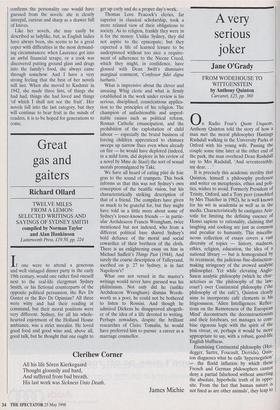Great gas and gaiters
Richard 011ard
TWELVE MILES FROM A LEMON: SELECTED WRITINGS AND SAYINGS OF SYDNEY SMITH compiled by Norman Taylor and Alan Hankinson Lutterworth Press, £19.50, pp. 224 If one were to attend a generous and well vintaged dinner party in the early 19th century, would one rather find oneself next to the real-life clergyman Sydney Smith, or his fictional counterparts of the opposite political persuasion, the Rev Dr Gaster or the Rev Dr Opimian? All three were witty and had their reading at command, but their moral positions were very different. Sydney, for all his whole- hearted enjoyment of the Holland House ambiance, was a strict moralist. He loved good food and good wine and, above all, good talk, but he thought that one ought to get up early and do a proper day's work.
Thomas Love Peacock's clerics, far superior in classical scholarship, took a more relaxed view of their obligations to society. As to religion, frankly they were in it for the money. Unlike Sydney, they did not aspire to the episcopate; but they expected a life of learned leisure to be underpinned without too nice a require- ment of adherence to the Nicene Creed, which they might, in confidence, have glossed with Dean Swift's dismissive marginal comment, 'Confessor fidei digna barbaris.'
What is impressive about the clever and amusing Whig cleric and what is firmly established in the work under review is his serious, disciplined, conscientious applica- tion to the principles of his religion. The champion of unfashionable and unprof- itable causes such as political reform, Roman Catholic emancipation, and the prohibition of the exploitation of child labour — especially the brutal business of forcing children apprenticed to chimney sweeps up narrow flues even when already on fire — he would have deplored (indeed, in a mild form, did deplore in his review of a novel by Mme de Stael) the sort of sexual morals promulgated by Mid.
We have all heard of eating pâté de foie gras to the sound of trumpets. This book informs us that this was not Sydney's own conception of the beatific vision, but his characteristically striking description of that of a friend. The compilers have given us much to be grateful for, but they might have told us a little more about some of Sydney's lesser-known friends — in partic- ular Archdeacon Francis Wrangham, twice mentioned but not indexed, who from a different political base shared Sydney's bold defiance of the moral and social cowardice of their brethren of the cloth. There is an enlightening essay on him in Michael Sadleir's Things Past (1944). And surely the coarse description of Talleyrand, ascribed on p. 27 to Sydney, is in fact Napoleon's?
What one not versed in the master's writings would never have guessed was his philistinism. Not only did he (unlike Archdeacon Wrangham) dismiss Words- worth as a poet, he could not be bothered to listen to Rossini. And though he admired Dickens he disapproved altogeth- er of the idea of a life devoted to writing. Perhaps nowadays, despite the brilliant researches of Claire Tomalin, he would have preferred him to pursue a career as a marriage counsellor.


































































 Previous page
Previous page